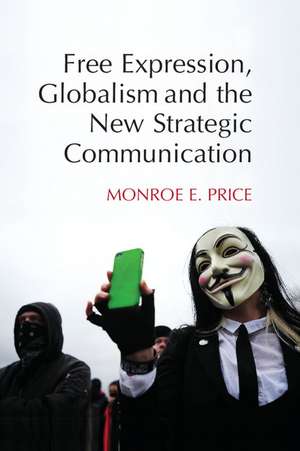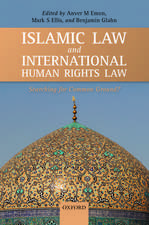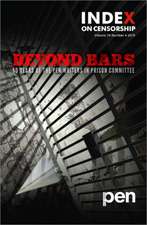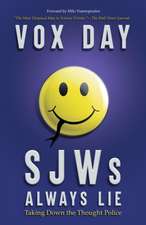Free Expression, Globalism, and the New Strategic Communication
Autor Monroe E. Priceen Limba Engleză Hardback – 14 dec 2014
| Toate formatele și edițiile | Preț | Express |
|---|---|---|
| Paperback (1) | 260.91 lei 6-8 săpt. | |
| Cambridge University Press – 14 dec 2014 | 260.91 lei 6-8 săpt. | |
| Hardback (1) | 627.26 lei 6-8 săpt. | |
| Cambridge University Press – 14 dec 2014 | 627.26 lei 6-8 săpt. |
Preț: 627.26 lei
Preț vechi: 704.78 lei
-11% Nou
Puncte Express: 941
Preț estimativ în valută:
120.04€ • 125.48$ • 101.43£
120.04€ • 125.48$ • 101.43£
Carte tipărită la comandă
Livrare economică 06-20 martie
Preluare comenzi: 021 569.72.76
Specificații
ISBN-13: 9781107072510
ISBN-10: 1107072514
Pagini: 286
Dimensiuni: 152 x 229 x 21 mm
Greutate: 0.52 kg
Editura: Cambridge University Press
Colecția Cambridge University Press
Locul publicării:New York, United States
ISBN-10: 1107072514
Pagini: 286
Dimensiuni: 152 x 229 x 21 mm
Greutate: 0.52 kg
Editura: Cambridge University Press
Colecția Cambridge University Press
Locul publicării:New York, United States
Cuprins
1. Moving the needle, filling the streets; 2. Strategic communication and the foundations of free expression; 3. Narratives of legitimacy; 4. Strategies of the diagnostic; 5. Asymmetries and strategic communication; 6. Strategies of system architecture; 7. Soft power, soft war; 8. Religions and strategic communication; 9. Regulating NGOs in the market for loyalties; 10. Strategic platforms; 11. Strategic communication and satellite channels.
Recenzii
'… Monroe Price challenges and transforms the way we observe, study and think about power and communications in society. A vivid, erudite and ambitious update of the theory of free expression - highly needed at a time of radical change in technology and geo-politics. Eloquent and masterly written, packed with surprising connections and refreshing metaphors. Price's 'architecture of information flows' construction thesis elaborated throughout the book is utterly enlightening - complimenting his prominent 'market for loyalties' argument. A book without any peer.' Stefaan G. Verhulst, Co-Founder and Chief of Research and Development, The GovLab, New York University
'Incisive in its analysis, comprehensive in its geographic sweep and up-to-the-minute in its scope, Monroe Price has written a splendid book on the challenges facing free expression in our globalized world. This is essential reading for all scholars of international communication and confirms Price's position as the leading thinker in his field.' Nicholas J. Cull, University of Southern California, Annenberg School for Communication and Journalism
'Price frames this book as an invitation to a dialogue over the future architecture of information systems - it is a conversation worth having. Impressively broad in scope, interdisciplinary, conceptually subtle and empirically detailed, Price traces how media law, international norms, strategic communications, transnational actors and statist geopolitics interact to shape the politics of free expression within a global society increasingly anxious about these processes. This is an important point of engagement for those interested in these issues, students and scholars alike.' Daniel McCarthy, University of Melbourne
'Admirably inclusive in its scope, this empirically-rich and theoretically sophisticated book makes a significant and strategic intervention in the study of international communication in our globalized digital age.' Daya Thussu, University of Westminster, London
'… a path-breaking book that charts new territory for the enormously important issue of speech in the digital age. Price skillfully weaves together diverse examples from Iran to Somaliland and explores the motivations of a wide variety of actors beyond governments, including NGOs and religious leaders. While recognizing the diverse approaches towards the relationship between speech and society, and the different cultural and political values that underlie this relationship, the book offers compelling arguments that clearly illustrate the substantial challenges societies face to uphold values such as free expression in the digital age. It is a bold and very readable account for all those interested in understanding how actors attempt to shape information environments from the global to local level.' Nicole Stremlau, Centre for Socio-Legal Studies, University of Oxford
'Incisive in its analysis, comprehensive in its geographic sweep and up-to-the-minute in its scope, Monroe Price has written a splendid book on the challenges facing free expression in our globalized world. This is essential reading for all scholars of international communication and confirms Price's position as the leading thinker in his field.' Nicholas J. Cull, University of Southern California, Annenberg School for Communication and Journalism
'Price frames this book as an invitation to a dialogue over the future architecture of information systems - it is a conversation worth having. Impressively broad in scope, interdisciplinary, conceptually subtle and empirically detailed, Price traces how media law, international norms, strategic communications, transnational actors and statist geopolitics interact to shape the politics of free expression within a global society increasingly anxious about these processes. This is an important point of engagement for those interested in these issues, students and scholars alike.' Daniel McCarthy, University of Melbourne
'Admirably inclusive in its scope, this empirically-rich and theoretically sophisticated book makes a significant and strategic intervention in the study of international communication in our globalized digital age.' Daya Thussu, University of Westminster, London
'… a path-breaking book that charts new territory for the enormously important issue of speech in the digital age. Price skillfully weaves together diverse examples from Iran to Somaliland and explores the motivations of a wide variety of actors beyond governments, including NGOs and religious leaders. While recognizing the diverse approaches towards the relationship between speech and society, and the different cultural and political values that underlie this relationship, the book offers compelling arguments that clearly illustrate the substantial challenges societies face to uphold values such as free expression in the digital age. It is a bold and very readable account for all those interested in understanding how actors attempt to shape information environments from the global to local level.' Nicole Stremlau, Centre for Socio-Legal Studies, University of Oxford
Notă biografică
Descriere
This book exposes the anxieties of loss of control and missed opportunities for freedom of expression resulting from changes in technologies and geopolitics.














